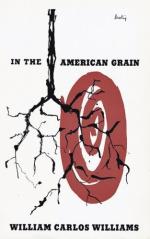|
This section contains 618 words (approx. 2 pages at 400 words per page) |

|
In the American Grain Summary & Study Guide Description
In the American Grain Summary & Study Guide includes comprehensive information and analysis to help you understand the book. This study guide contains the following sections:
This detailed literature summary also contains Topics for Discussion on In the American Grain by William Carlos Williams.
What is the American identity? What do the words and actions of those who first came to America say about how the nation's identity has been shaped? What is America's history – who writes it and who controls how we see our nation’s heroes and villains alike? William Carlos Williams examines these questions in this collection of essays, "In the American Grain", about the first explorers and settlers who put their stamp of identity onto the national character. Williams mainly believes Americans have turned away – as many of the first figures did – from what was good and original about the New World, and in fear and a smallness of imagination have formed an American identity that is inaccurate. Williams includes some unusual and obscure figures – and reveals some colorful opinions of those whose reputations that may need to be reconsidered. His aim is to see even the most tired figures with a fresh eye, and his view of the “American Grain” is surprising and completely original.
In 1925, important artists or writers went to France. America was raw, its cultural life gauche and unsophisticated. William Carlos Williams goes to France, but comes home with a new perspective on the American character. He writes this collection of essays as an indictment and celebration of what it means to be an American, especially an American writer.
Williams includes twenty-one historical figures that have put their indelible stamp on the American psyche. Some are familiar names that need to be better understood. Others are unknown to most. Williams asserts that Americans need to read and study the original writings of these (all except one) men, and he asks the reader to consider his vision that is impressionistic, poetic and soulful.
In essays that are roughly chronological and build on each other in theme and metaphor, the author considers the first explorers and their legacies in the New World. The Spaniards come to plunder and convert; if the total destruction of the indigenous population results, well, they are heathens without souls, anyway. Williams paints both a highly civilized society (Tenochtitlan) and a glorious paradise (the Caribbean Islands and southern America), and in both the spirit of its murdered and enslaved populations is inextricably bound up with the land.
The Puritans are a dried up seed while the Native Americans are a beautiful flower; but the soul-dead shrewdness of the Puritans is essential in order for colonies to be established in New England’s primitive forests. Ben Franklin and George Washington, logical offshoots of the Puritan ethic, are drawn with Williams’s fresh eye. On the other hand there are those who see in the Native Americans the natural and rightful expression of the New World’s soul, Pére Sebastian Rasles and Daniel Boone, for example. And then there are those who have a vision of America’s greatness as a political and literary power, like Aaron Burr and Edgar Allen Poe; but their voices are not loud enough or simple enough for their ideas to be accepted.
Williams looks at the original writings and then applies his poetic sensibility and original and unconventional thinking to the question of America’s legacy of thought and soul. In essays that vary from straightforward essay style to stream-of-consciousness musings of questionable intent, Williams questions the traditional American assumptions about the nation's collective soul. It is there, he says. It is in the land and in the souls of the first murdered tribes as well as in the violence and close-mindedness of the Puritans, the ineptitude of the pioneers, the despair of Poe, the oppressive anti-sexuality of colonial women. It is there for Americans to find it and build from it a better nation.
Read more from the Study Guide
|
This section contains 618 words (approx. 2 pages at 400 words per page) |

|



